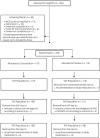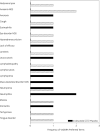Inhaled ciclesonide is efficacious and well tolerated in the treatment of severe equine asthma in a large prospective European clinical trial
- PMID: 33403727
- PMCID: PMC8518630
- DOI: 10.1111/evj.13419
Inhaled ciclesonide is efficacious and well tolerated in the treatment of severe equine asthma in a large prospective European clinical trial
Abstract
Background: Ciclesonide is a glucocorticoid prodrug, already registered for human use. Due to its mode of action and inhaled route of administration, it was considered an appropriate treatment option for horses with severe equine asthma. Although the efficacy of inhaled ciclesonide has been demonstrated in horses with asthma exacerbations under controlled mouldy hay challenge conditions, it has not yet been reported under field conditions.
Objectives: To assess the effectiveness and safety of inhaled ciclesonide for the treatment of severe equine asthma.
Study design: Prospective, multicentre, placebo-controlled, randomised, double-blinded study.
Methods: Two-hundred and twenty-four client-owned horses with severe equine asthma were randomised (1:1 ratio) to receive either ciclesonide inhalation (343 µg/actuation) solution or placebo (0 µg/actuation). Treatments (placebo or ciclesonide) were administered with a nonpressurised Soft Mist™ inhaler specifically developed for horses (Aservo® EquiHaler® ) at doses of 8 actuations twice daily for the first 5 days and 12 actuations once daily for the following 5 days. Primary outcome was a success/failure analysis with the a priori definition of treatment success as a 30% or greater reduction in weighted clinical score (WCS) between Day 0 and Day 10 (±1).
Results: The treatment success rate (as defined above) in ciclesonide-treated horses was 73.4% (80/109) after 10 (±1) days of treatment, being significantly higher than in the placebo group with 43.2% (48/111; P < 0.0001). Few systemic and local adverse events of ciclesonide were observed.
Main limitations: The severity of clinical signs of severe equine asthma varies over time; despite the prohibition of environmental management changes during the study, a placebo effect was also identified. This potentially contributed, in part, to the clinical improvement observed in the ciclesonide-treated group.
Conclusions: Ciclesonide inhalation solution administered by the Aservo® EquiHaler® effectively reduced severity of clinical signs in a majority of horses with severe equine asthma and was well tolerated.
Keywords: ciclesonide; clinical trial; cough; equine asthma; heaves; horse; inhaled corticosteroids.
© 2021 Boehringer Ingelheim Vetmedica GmbH. Equine Veterinary Journal published by John Wiley & Sons Ltd on behalf of EVJ Ltd.
Conflict of interest statement
B. Albrecht, O. Engel and M. von Salis‐Soglio are employees of Boehringer Ingelheim Vetmedica GmbH, the marketing authorisation holder of Aservo® Equihaler® with ciclesonide as active ingredient. H.‐W. Mueller is an employee of Boehringer Ingelheim Pharma GmbH & Co KG. R.S. Pirie has acted as consultant to Boehringer Ingelheim Vetmedica GmbH. B. Albrecht is co‐inventor on a patent regarding the use of ciclesonide in horses.
Figures




References
-
- Lavoie JP. Is the time primed for equine asthma? Equine Vet Educ. 2015;27:225–6.
-
- Pirie RS, Couetil LL, Robinson NE, Lavoie JP. Equine asthma: an appropriate, translational and comprehendible terminology? Equine Vet J. 2016;48:403–5. - PubMed
-
- Bullone M, Lavoie JP. Asthma "of horses and men"‐How can equine heaves help us better understand human asthma immunopathology and its functional consequences? Mol Immunol. 2015;66:97–105. - PubMed
-
- Couetil LL, Chilcoat CD, DeNicola DB, Clark SP, Glickman NW, Glickman LT. Randomized, controlled study of inhaled fluticasone propionate, oral administration of prednisone, and environmental management of horses with recurrent airway obstruction. Am J Vet Res. 2005;66:1665–74. - PubMed
Publication types
MeSH terms
Substances
Grants and funding
LinkOut - more resources
Full Text Sources
Other Literature Sources
Medical

